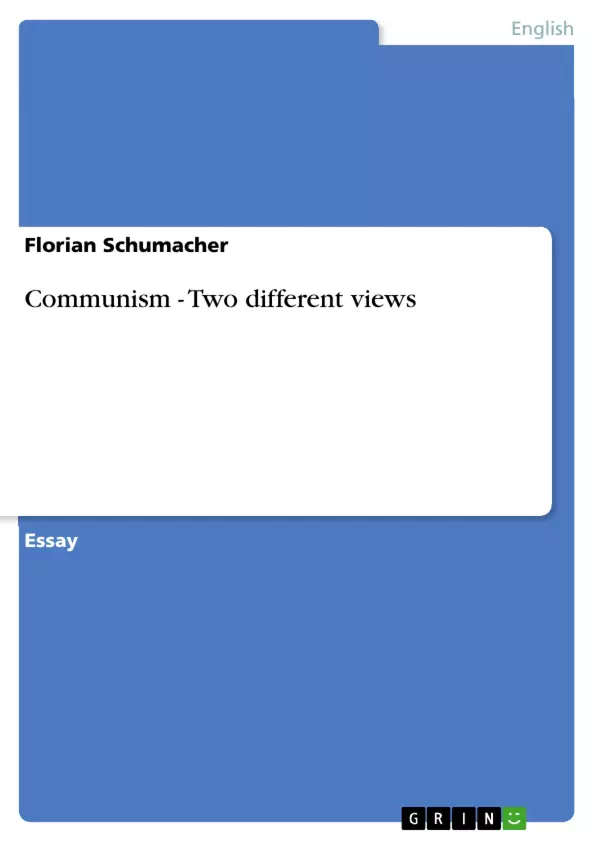The basis of my paper is a comparison between communism the way it is supposed to be, as defined by Karl Marx and Frederick Engels in the Communist Manifesto, and the way communism looks in reality, as it is described in Milan Kundera’s Book of Laughter and Forgetting. At the beginning of this paper I will summarize the main ideas regarding communism both of Marx and of Kundera, and afterwards I will compare those two points of view.
In the first part of his Communist Manifesto, Marx says that the world is ruled by the bourgeoisie and its capitalist attitude. With his manifesto, he wants to encourage the Proletariat of the world to unite and fight side by side against capitalism. He thinks that the main task of the communist party is to point out the common interest of the entire Proletariat and to represent the interests of the movement as a whole. The main theory of communism is – according to Marx – the abolition of all private property, and in order to achieve that, the party is even willing to sacrifice some parts of the individual freedom (like abolishing families) as a part of the process to free the Proletariat from its oppressors.
Marx even admits that communism wants to abolish the eternal truths like freedom and justice, as well as religion and morality. As some of the most important measures to make communism possible he names heavy income taxes, abolition of property in land and, what is very important considering my paper, the centralization of the means of communication and transportation in the hands of the state. Being able to control the means of communication is an important factor for a state to control and manipulate its population – like the example of CNN and the manipulative media in the United States shows every day.
Inhaltsverzeichnis (Table of Contents)
- Introduction
- Marx’s Communist Manifesto
- Kundera’s Book of Laughter and Forgetting
- Comparison of Marx’s and Kundera’s Views
- Conclusion
Zielsetzung und Themenschwerpunkte (Objectives and Key Themes)
This paper compares and contrasts the idealized concept of communism as outlined by Karl Marx and Frederick Engels in the Communist Manifesto with the reality of communism as depicted in Milan Kundera’s novel, Book of Laughter and Forgetting. The paper aims to examine the discrepancies between the theoretical ideals and the practical implementation of communist principles.
- The theoretical ideals of communism as presented by Marx and Engels
- The practical implementation of communism in Czechoslovakia as described by Kundera
- The role of individual freedom and human rights in achieving communist goals
- The impact of totalitarian rule on communist societies
- The contrasting perspectives of Marx and Kundera on the nature of communism
Zusammenfassung der Kapitel (Chapter Summaries)
The introduction establishes the paper's focus on comparing Marx and Kundera’s perspectives on communism. The paper then explores Marx's theoretical framework for communism in the Communist Manifesto, outlining key concepts such as the abolition of private property, the role of the Proletariat, and the need for state control over communication and transportation.
Next, the paper examines Kundera's depiction of communism in Czechoslovakia, highlighting the initial enthusiasm for communist ideals, the subsequent disillusionment with the harsh reality of the regime, and the struggle for a more liberal form of socialism.
The paper then compares and contrasts the views of Marx and Kundera on communism, highlighting the fundamental differences between their perspectives on individual freedom, the role of the state, and the potential pitfalls of totalitarian rule.
Schlüsselwörter (Keywords)
This paper focuses on the key concepts of communism, individual freedom, state control, totalitarian rule, and the contrasting perspectives of Marx and Kundera. The paper explores themes related to the implementation of communist ideology, the role of human rights, and the consequences of authoritarian regimes.
Frequently Asked Questions
What is the main comparison in this paper?
The paper compares communism as an idealized theory (Marx & Engels' Communist Manifesto) with its practical reality as depicted in Milan Kundera’s novel "The Book of Laughter and Forgetting."
What are the core goals of communism according to Marx?
Marx proposed the abolition of private property, heavy income taxes, and the centralization of communication and transportation in the hands of the state to free the Proletariat from capitalist oppression.
How does Milan Kundera depict communism in reality?
Kundera illustrates the disillusionment, the loss of individual freedom, and the impact of totalitarian rule in Czechoslovakia, contrasting sharply with the theoretical promises of equality.
Why is the control of communication important in communist theory?
Marx advocated for state control of communication as a measure for transition, but in practice, as the paper notes, this often leads to the manipulation and control of the population by the state.
Does communism accept "eternal truths" like religion or morality?
Marx admitted that communism seeks to abolish eternal truths like freedom and justice, as well as religion and morality, to replace them with a new social basis.
- Quote paper
- Florian Schumacher (Author), 2004, Communism - Two different views, Munich, GRIN Verlag, https://www.grin.com/document/113198



